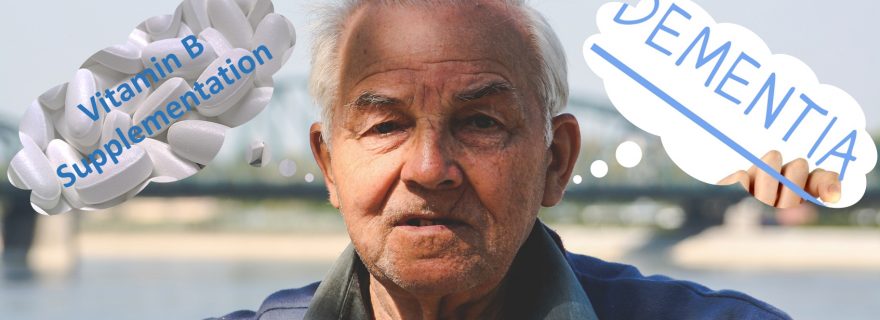Vitamin B supplementation against dementia and cognitive decline
Vitamin B12, B6 and folic acid are said to be preventive for dementia. But would you secretly feed your grandpa with vitamin supplements to save him from dementia – if he doesn’t want to take it?
„I do not take nutrition supplements against dementia or cognitive decline. That’s nonsense!“
– Quote from my 89 years old grandpa
Well, if you do or not – that’s your moral choice. But before you decide, you should definitely have a look at the current research concerning the effects of folic acid, vitamin B12 and vitamin B6 on the development of strokes, dementia and cognitive decline in elderly. So, what is the latest status of research?
Vitamin B6, B9 (folic acid, folate) and vitamin B12 are very important for our body: They are involved in building the human DNA and they are required to convert the harmful amino-acid homocysteine into the helpful cysteine. The problem is: Many people don’t get enough B vitamins through their nutrition, a lack of vitamin B12 occurs in more than 20% of elderly. Especially for elderly this can be a problem, because high levels of homocysteine respectively low levels of B vitamins are known to be related to strokes, cognitive impairment and dementia like Alzheimer’s disease.
In a big meta-analysis, researchers analyzed data from more than 8500 patients. They calculated, that the chances of dementia can be reduced by about 20 % - if older people would take the vitamin B supplementation on a daily basis. A different team of researchers found that the supplementation of the three vitamins could slow down the brain-atrophy (loss of neurons) in older people with high homocysteine levels about more than 50%!
The intake of the right amount of vitamin B6, B12 and folic acid reduces the homocysteine levels in the body about 30%. The current research shows, that a high-dose and long-term supplementation of vitamin B6, B9 and B12 seems to be a promising method for reducing the chances of dementia and cognitive decline in older people – especially for men with low vitamin B and high homocysteine values. Of course there is still a lot of research to do, and the effectiveness of B vitamins is not completely proven, yet. But the question is: When the supplementation seems to work, why is not everyone taking it? How can you convince your grandparents to take it?
When I first heard of the positive effects on cognition of vitamin B supplementation one year ago, I told my grandpa about that. He is 89 years old and still free from dementia or cognitive impairment. I said: “Hey grandpa, maybe you should take vitamin B supplements, I read it is good against cognitive impairment.” His answer was: “We didn’t have any vitamin supplements 50 years ago and people didn’t get Alzheimer’s disease, so why should I need it now? I do not take nutrition supplements against dementia or cognitive decline. That’s nonsense! Anyway, my mind is healthy so I don’t need it.” I didn’t know what to reply, so I accepted his answer – probably he was right, I thought.
One year later I read a lot about current research (as summarized above) – so I came up with this topic again. This time, I told him about numbers, facts, experiments, and I could answer many of his questions. “Up to 50% less brain shrinkage?”, he asked. “30% less of this ,bad’ homocysteine? 20% reduced chances for dementia?” “Well”, I said, “at least that’s what some researchers found out”. The next day he called me, asking me to buy these ,anti-dementia vitamins’ for him.
References
Brattström, L., Lindgren, A., Israelsson, B., Andersson, A., & Hultberg, B. (1994). Homocysteine and cysteine: determinants of plasma levels in middle‐aged and elderly subjects. Journal of internal medicine, 236(6), 633-641.
DeJager, C. A., Oulhaj, A., Jacoby, R., Refsum, H., & Smith, A. D. (2012). Cognitive and clinical outcomes of homocysteine‐lowering B‐vitamin treatment in mild cognitive impairment: a randomized controlled trial. International journal of geriatric psychiatry, 27(6), 592-600.
Graham, I. M., Daly L, E., & Refsum, H. M. (2005). Dose-dependent effects of folic acid on blood concentrations of homocysteine: a meta-analysis of the randomized trials. The American journal of clinical nutrition, 82(4), 806-812
Smith, A. D. (2008). The worldwide challenge of the dementias: a role for B vitamins and homocysteine? Food and nutrition bulletin, 29(1), 143-172.
Van Dam, F., & Van Gool, W. A. (2009). Hyperhomocysteinemia and Alzheimer's disease: A systematic review. Archives of gerontology and geriatrics, 48(3), 425-430.
Wald, D. S., Kasturiratne, A., & Simmonds, M. (2011). Serum homocysteine and dementia: meta-analysis of eight cohort studies including 8669 participants. Alzheimer's & Dementia, 7(4), 412-417.


0 Comments